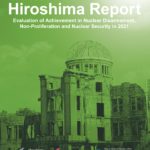Preface and Acknowledgements
This report, Hiroshima Report 2020: Evaluation of Achievement in Nuclear Disarmament, Non- Proliferation and Nuclear Security in 2019 (hereinafter referred to as “Hiroshima Report 2020”) is an outcome of the “Hiroshima Report Publication Project,”1 commissioned by Hiroshima Prefecture to the Japan Institute of International Affairs (JIIA). It updates the previous reports issued since 2013. As in the last five years, the Hiroshima Report is published in both Japanese and English.
The prospects of eliminating nuclear weapons are still distant at best. Even more worrying, the situation regarding nuclear weapons is becoming more and more complex. The five nuclear-weapon states (NWS) under the Nuclear Non-Proliferation Treaty (NPT)—China, France, Russia, the United Kingdom and the United States—and other nuclear-armed states—India, Israel and Pakistan—continue to perceive their nuclear weapons as one of the indispensable components for their national security, and have not made any definite move toward renouncing their nuclear arsenals. Instead, they have taken measures, such as modernization of nuclear forces and development of new delivery vehicles, with a view to sustaining nuclear deterrence for a longer period. Furthermore, the U.S. withdrawal led to the demise of the Intermediate-Range Nuclear Forces (INF) Treaty. Non-nuclear-weapon states (NNWS) grow increasingly frustrated over such a situation. Many of them pursue the promotion of a legal prohibition of nuclear weapons, and finally achieved the Treaty on the Prohibition of Nuclear Weapons (TPNW) on July 7, 2017. However, nuclear-armed states and allies have refused to sign the treaty.
Meanwhile, the status and prospects regarding nuclear non-proliferation are also gloomy. Despite the convening of the U.S.-North Korean summits, there was little progress made toward resolving the North Korean nuclear issue. In addition, Pyongyang seems to have not made a strategic decision on renouncing its nuclear arsenals. As for the Iran nuclear issue, after showing patience for a year after the US withdrew from the Joint Comprehensive Plan of Action (JCPOA) in May 2018 and subsequent imposition of sanctions, Iran began to steadily withdraw from its own obligations under the deal. As the world falters in erecting a firm barrier against nuclear proliferation, the threat persists for a new proliferator to emerge on the scene. The threat of nuclear terrorism by non-state actors remains a high security concern in this globalized world.
The Hiroshima Report attempts to help the movement toward the abolition of nuclear weapons, first, by clarifying the current status of the issues and efforts surrounding nuclear disarmament, non-proliferation and nuclear security. In doing so, it aims to encourage increased debate on these issues by policy-makers, experts both within and outside governments, and civil society. Furthermore, by issuing the “Report” and the “Evaluation” from Hiroshima, where a nuclear weapon was once used, it aims to help focus attention and promote further actions in various fields toward the realization of a world without nuclear weapons.
The Research Committee was established to conduct this project, namely producing the “Report” and the “Evaluation.” This Committee met once within the Japanese Fiscal Year 2019 to discuss its content. The members of the Research Committee are as follows:
Chairperson
Yasunori Nakayama (Acting Director, Center for Disarmament, Science and Technology (CDAST), JIIA)
Research Members
Nobumasa Akiyama (Dean, School of International and Public Policy, Hitotsubashi University)
Sukeyuki Ichimasa (Senior Research Fellow, National Institute for Defense Studies) Akira Kawasaki (Executive Committee Member, Peace Boat)
Masahiro Kikuchi (Board Member, Nuclear Material Control Center)
Mitsuru Kurosawa (Professor, Osaka Jogakuin College)
Kazumi Mizumoto (Professor, Hiroshima Peace Institute, Hiroshima City University)
Miho Okada (Research Fellow, JIIA)
Hiroshi Tamai (Senior Expert, Integrated Support Center for Nuclear Nonproliferation and Nuclear Security, Japan Atomic Energy Agency)
Research Member and Project Coordinator
Hirofumi Tosaki (Senior Research Fellow, CPDNP, JIIA)
The Research Committee appreciates the comments and advice to the “Report” given by the following experts:
Ambassador Nobuyasu Abe (Former U.N. Under-Secretary-General for Disarmament Affairs and former Commissioner of the Japan Atomic Energy Commission)
Mr. Mark Fitzpatrick (Former Executive Director of the Americas Office and head of the Non-Proliferation and Disarmament Programme, International Institute for Strategic Studies)
Professor John Simpson (Emeritus Professor of International Relations, University of Southampton)
Professor Tatsujiro Suzuki (Director, Research Center for Nuclear Weapons Abolition, Nagasaki University)
The views or opinions expressed in the “Report,” “Evaluation” and “Columns” are those of the members of the Research Committee or respective authors, and do not necessarily represent the view of the Hiroshima Prefecture, the JIIA, or the organizations to which they belong. Not all of the members necessarily agree on all of the points discussed.
1 This project has been conducted as a part of the “Hiroshima for Global Peace” Plan launched by Hiroshima Prefecture in 2011.





